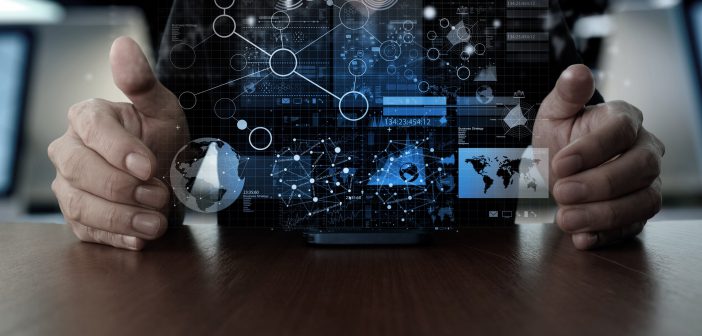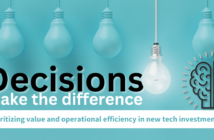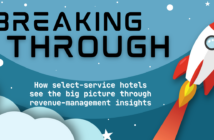Convert complex data into actionable analytics to realize its potential
by NATHAN SYKES
Big data is taking the world by storm. Make no mistake – it’s not just for the IT industry. While there are numerous forms of sophisticated technologies used in the field of big data analytics, the results of this data are usable in nearly every profession – including the hotel and hospitality industry.
WHAT IS BIG DATA?
The term “big data” means many different things to different people. Generally speaking, it describes the collection of information – from both offline and online sources – to support the ongoing development and operations of a company or organization.
Data can originate from almost anywhere, including everything from historical records, point-of-sale devices and current consumer habits to customer feedback, referrals and online reviews. With so much information coming from all directions, it’s tough to rein it all in and apply it a useful way – but that’s where the discipline of big data analytics comes into play.
It’s crucial to define big data when trying to understand its role in hotel and hospitality. With so many companies embracing big data and applying it to improve their operations, it might be the key to maintaining competitiveness in the future.
HOW DOES IT APPLY TO THE INDUSTRY?
Big data has relevant applications in nearly every industry imaginable. To use this information to its fullest extent, it’s important to know where it has the greatest impact.
Customer categorization. One of the keys to maximizing profits – regardless of industry – is in the categorization and identification of incoming customers. Most experienced sales reps can gain a basic understanding of a customer’s spending habits in as little as one visit, but even this can be misleading. To properly categorize a customer according to their potential for profitability, for example, proactive companies must track customer spending habits over time.
Personalized service. More companies are offering customized services to cater to their most valuable customers – either in groups or as individuals. But hotels can’t always rely on internal data to predict a customer’s return. Instead, data analysts have to collect data from surrounding, external sources to help identify travel patterns, habits and common timeframes.
Social media. In today’s Internet-centric age, online communities are just as important as their traditional counterparts. Since many customers turn to social media for questions, issues and concerns, the platform provides a great opportunity to connect with consumers in brand-new ways. Air France alone has compiled vast datasets containing online search histories, completed bookings and even airport lounge activities on every one of their customers – more than 90 million of them. The data helps officials create personalized travel experiences for their frequent guests.
Yield management. Big data analytics also affects yield management. By calculating the optimum value of each room and factoring in metrics like seasonal demands, regular guests and similar trends, hotels can ensure maximum profits.
Regardless of whether hotels are trying to classify their patrons with better accuracy, provide personalized services, engage their social media audience or stretch the value of their properties, they must use and apply all this data before it has an impact. The information on its own is dormant until activated through the disciplines of big data processing and analysis.
DESCRIPTIVE, PREDICTIVE AND PRESCRIPTIVE ANALYTICS
Descriptive analytics – used to glean data from past occurrences and activities – is commonly seen in industries like marketing and advertising. Predictive analytics uses big data to try and forecast future outcomes or events, while prescriptive analytics takes advantage of highly advanced algorithms to process big data and provide actionable advice. All three of these methods are common strategies for applying big data in the hotel and hospitality industry.
Descriptive analytics. This method is one of the most straightforward and efficient ways of generating actionable data. Did a recent renovation increase sales, or was it ultimately a waste of capital? It’s easy to answer questions like this via descriptive analytics – it’s a decades-old method that has assumed many different forms over the years.
Predictive analytics. Basic examples of predictive analytics include preparing a hotel for a seasonal rush – like spring break – and reducing the hours of staff members to accommodate the fewer number of reservations in the offseason.
Prescriptive analytics. Instead of letting the human workforce interpret and act on this information without any guidance, some of today’s systems provide recommendations and advice to improve service and increase profits. Online reservation systems that track a guest’s past stays can automatically generate discount codes for future reservations, assemble personalized services for each guest and even deliver their favorite drinks or food.
Big data analytics has the potential to completely transform the customer experience within the hotel and hospitality industry. It’s not something that will happen overnight, but the industry is already making huge strides toward a full-on embrace of big data and all the advantages it has to offer.
Some of the most tech-savvy hotel chains are already adopting long-term strategies and policies for big data management. Those who are unwilling – or hesitant – might find it hard to compete in the coming years.
THE FUTURE OF BIG DATA
The niche of big data is still in its infancy, but it’s already sparked storms of creativity and innovation in any industry it’s touched, including hotels and hospitality. Even the most sophisticated of predictive analytics can’t tell us exactly where big data is headed, but customers are sure to be pleased with the results




